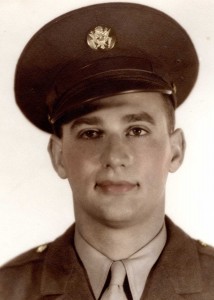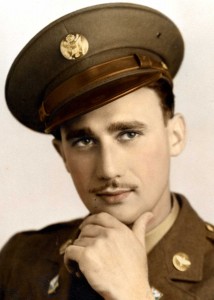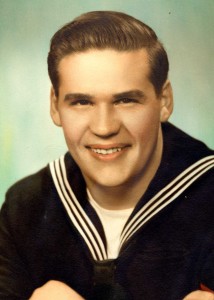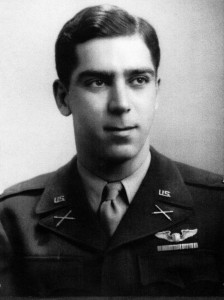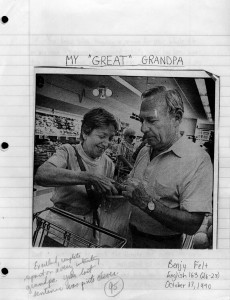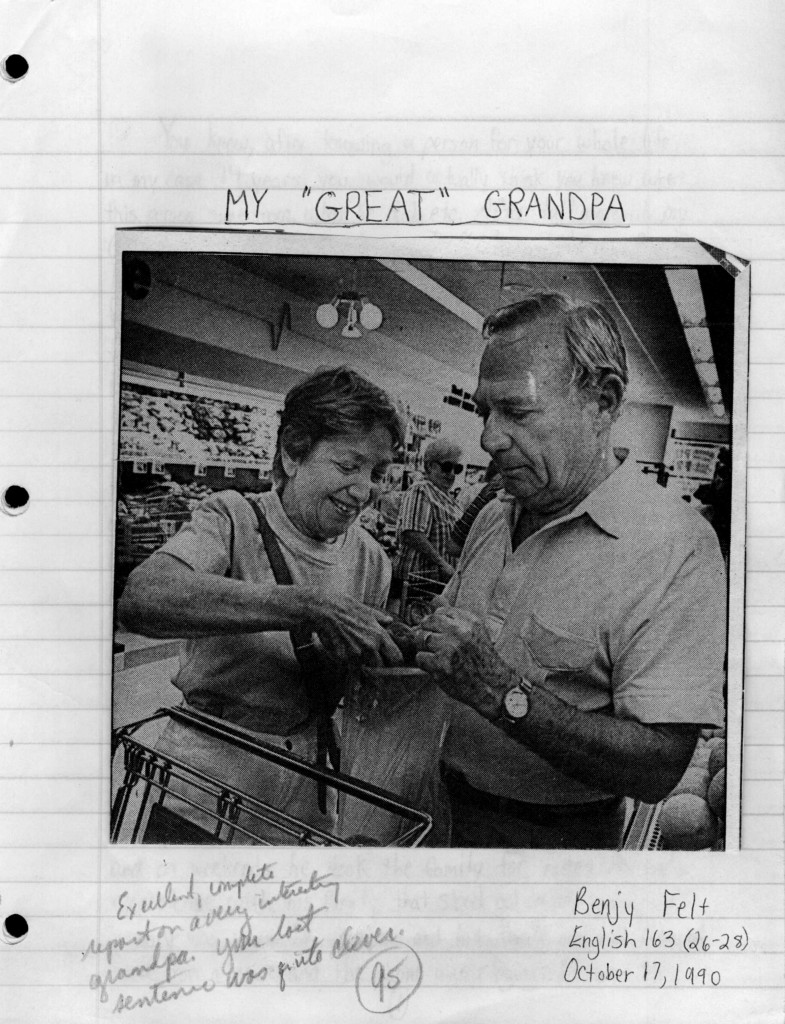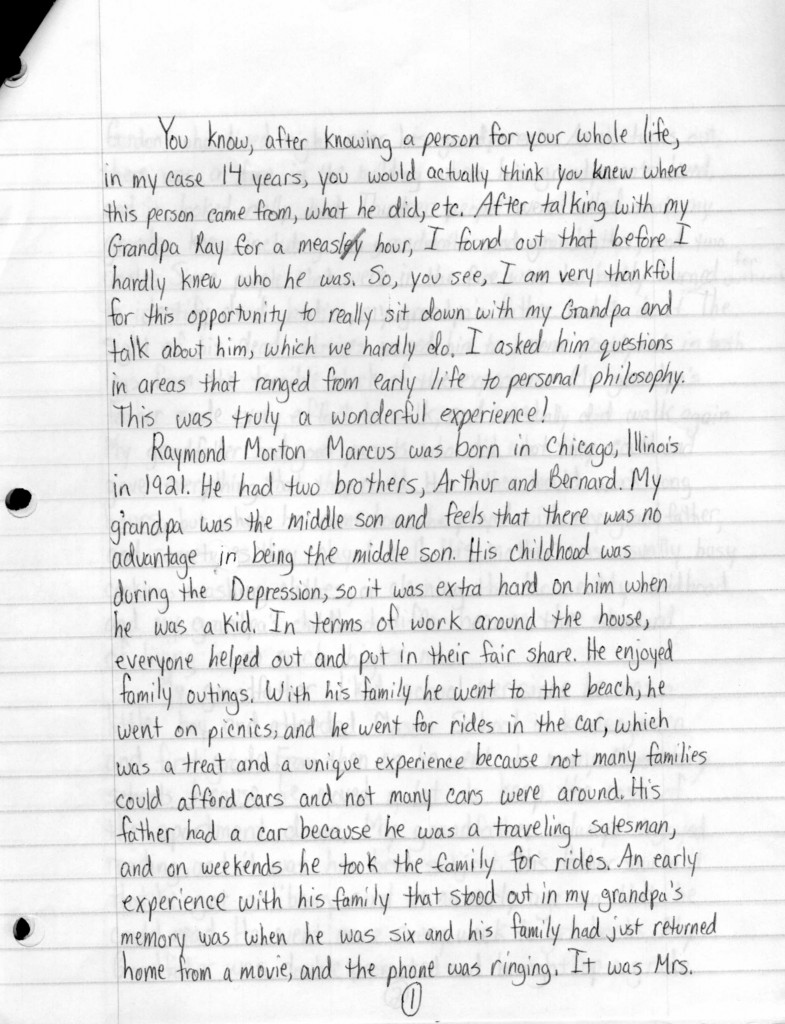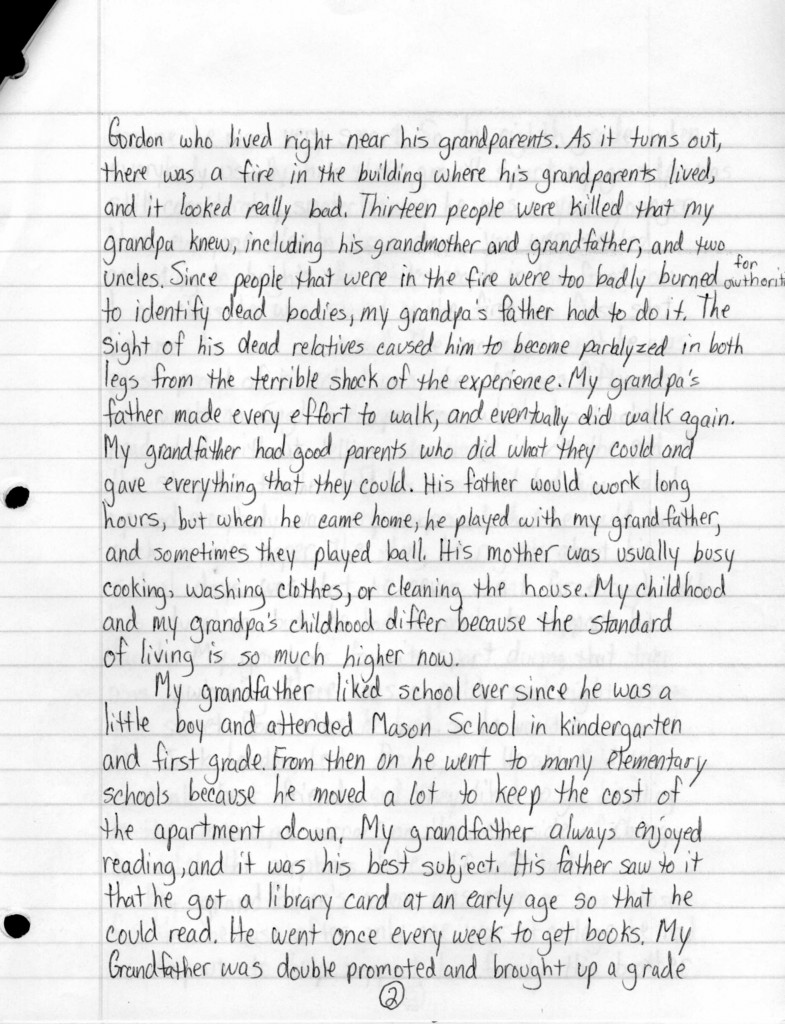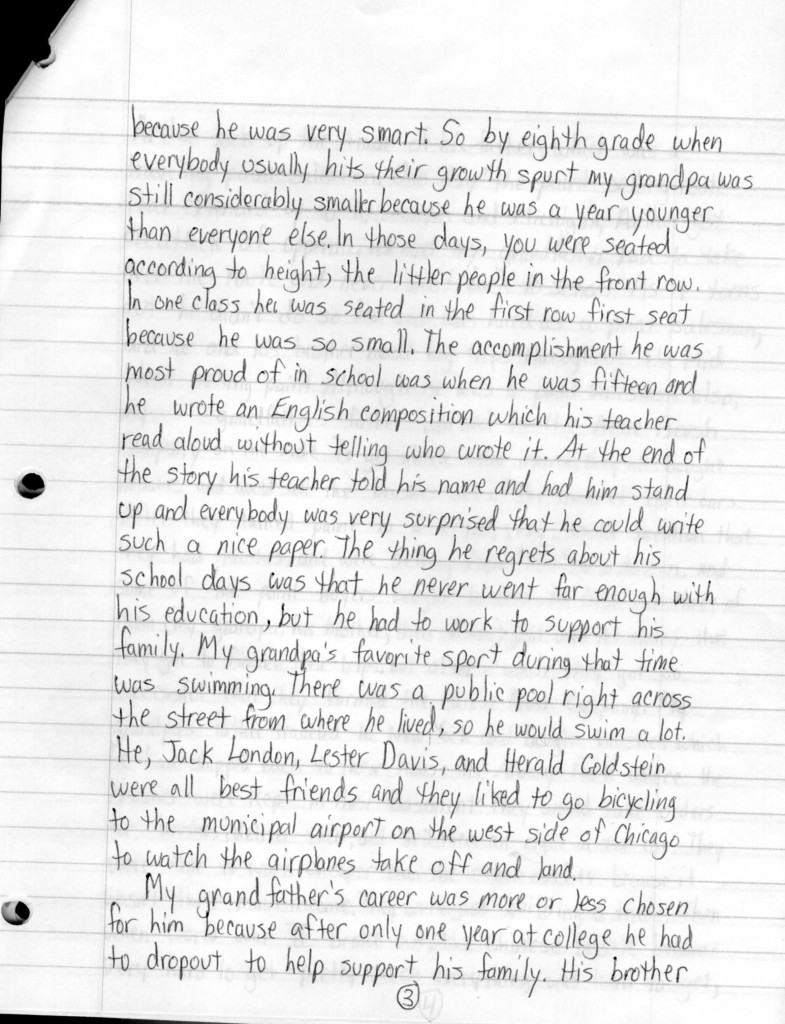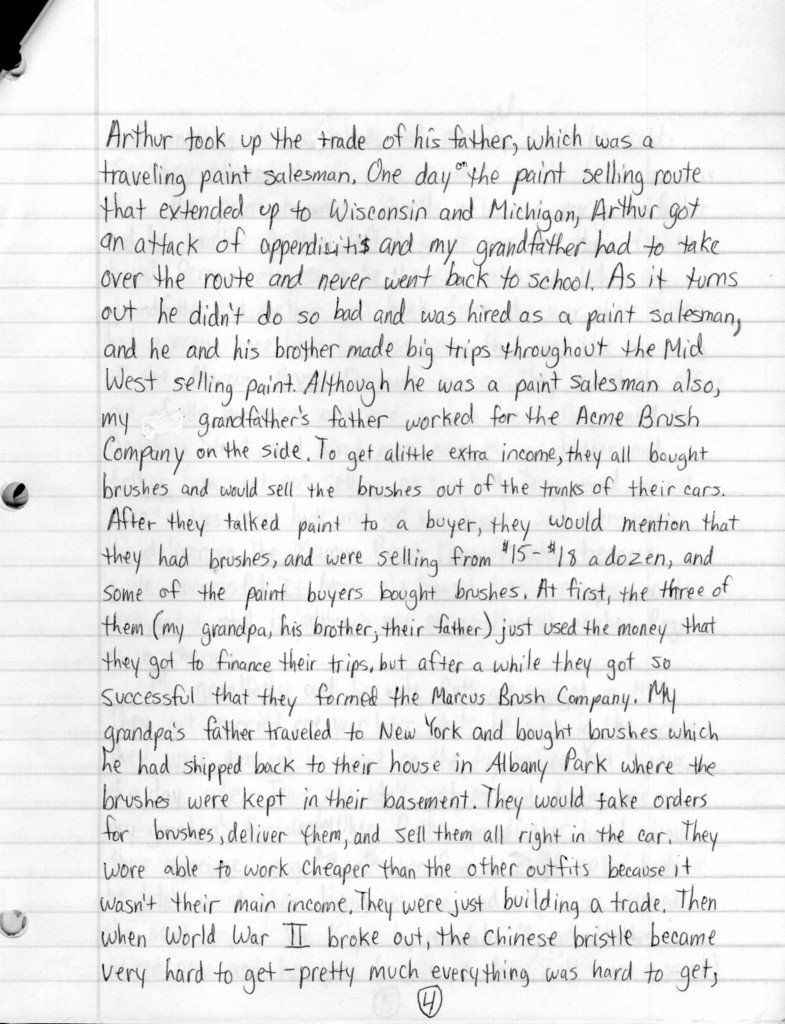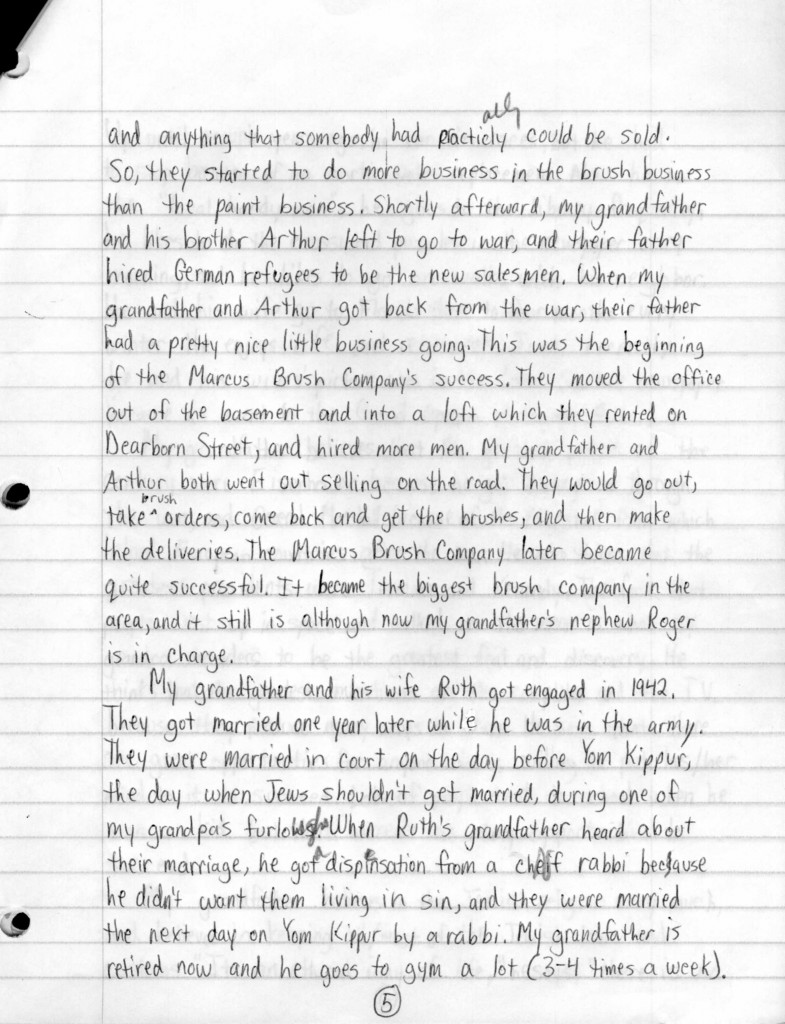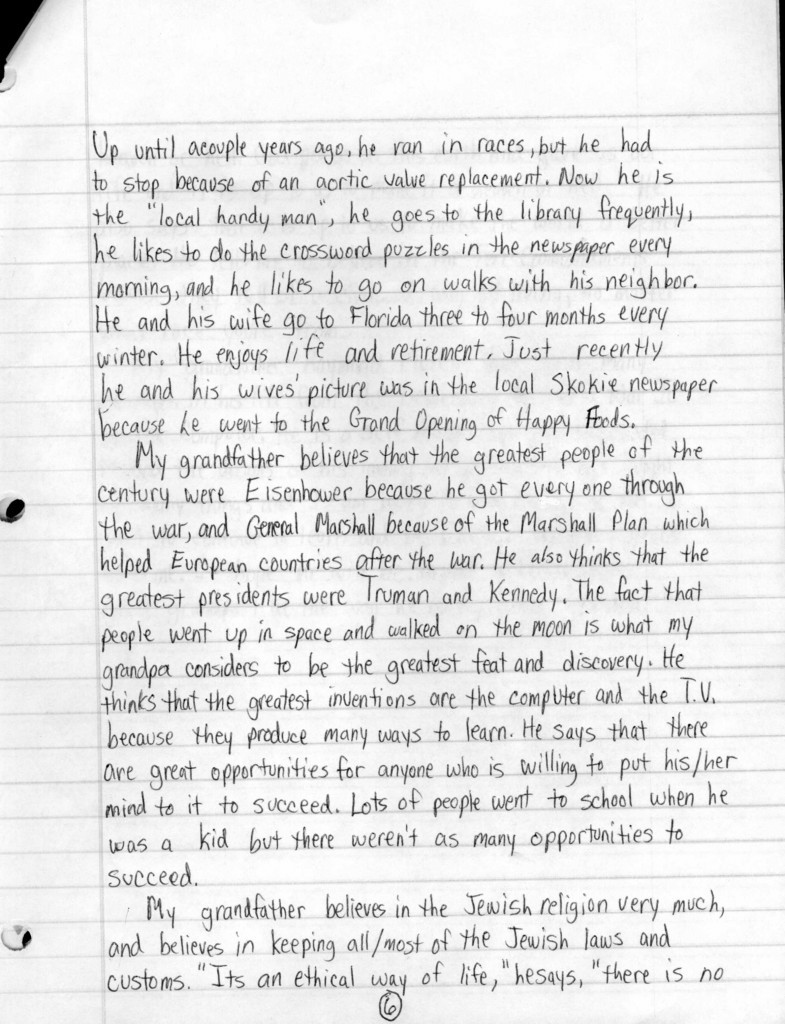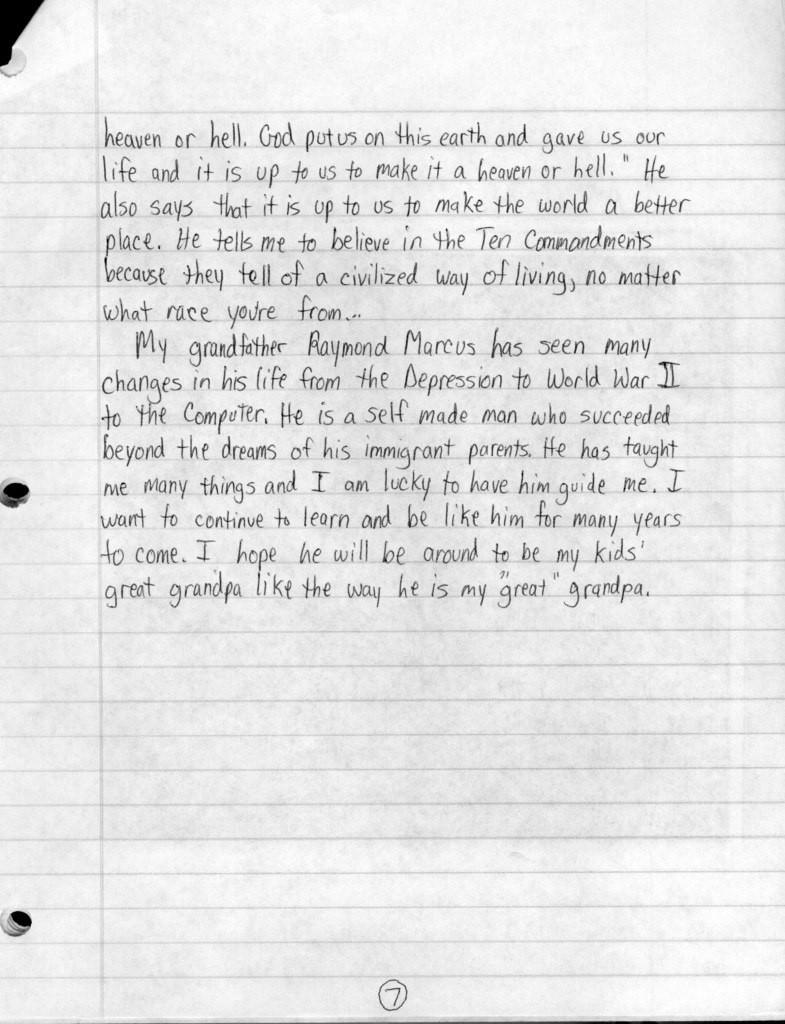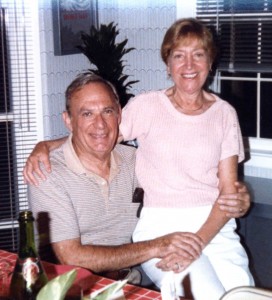
Ray & Ruth Marcus at the Felt home | Approximately 1983, celebrating their 40th wedding anniversary
These eulogies were given by my uncle, mother, and father at the May 10, 2010, memorial service for my grandfather, Raymond Marcus; he had died three days prior, just two weeks shy of his 89th birthday. It was unseasonably, bitterly cold that day — all the more reason for my siblings and cousins and me, gathered at the graveside, to huddle together. These stories were shared before we visited the cemetery, when first we gathered at Weinstein Funeral Home in Wilmette, IL.
Richard Marcus
Over the last week and a half I wrote, first one, and then a second eulogy, word for word. A day or so after I wrote each of them, I threw each one out. Those efforts just didn’t tell the story that I wanted to share. My dad, I have come to realize, was a complex man. I don’t know if I have the ability or the words to do him justice. I stayed up way late last night preparing this, and then couldn’t sleep knowing I still didn’t get it right. So even before I begin, I ask you, my family, my friends, to help me with this job, to speak about my dad with your stories and reminiscences, to fill in the gaps that I know I am leaving out.
I best get started with the easy part. My father wasn’t an especially large man. He stood no taller than me. But his frame was bigger. He had wide shoulders, a barrel chest, thick, hard arms, and remarkably strong hands. Dad’s typical day at Marcus Brush Company entailed both office chores and strenuous physical labor. After retirement, he became a gym rat. He and my mom took exercise classes for years. Dad lifted weights in the gym until he was 80 and walked three miles a day until he was 85. And in his last year, and actually until the final few days of his life, Dad insisted on taking a walk each morning through the long corridors of the Care Center — exercise and exertion were a part of Dad’s make-up that even his dementia couldn’t take away. As a result, for my entire life, I knew that Dad was strong and hard as nails.
But despite his own personal traits, Dad didn’t judge other men by their size, strength or toughness. My father taught me that “you don’t take the measure of a man by the size of his shoulders but by how he accepts and carries out responsibilities.” That was my dad’s code. That was how he lived his life and interpreted the world.
For seven summers, during my high school and college years, I worked alongside my father and grandfather, my uncle and my cousins Ken and Roger, at the Marcus Brush Company, the family business. To this day, I am grateful for those summers and for the opportunity to see the world that my dad operated in five or six times a week, a world that he would go to every week for 40 years. I saw how he interacted with his employees, his customers, his suppliers and all the characters in the neighborhood of 23rd and Canal.
I saw that Dad, while expecting his employees to put in a day’s work for a day’s pay, also believed in paying a fair day’s wage for that day’s work. I saw that my dad was a straight shooter. He said what he meant and meant what he said. If he made a commitment, he made every effort to fulfill it, and if he couldn’t, he didn’t make up excuses as to why.
But most of all, I came to understand just how hard my dad worked for the salary he earned. I came to understand the challenges and tensions, the set-backs and aggravations that a typical day in my father’s working life could hold.
And what was the motivation for the efforts I saw? My dad had few indulgences beyond a gym membership and a weekly massage. No, he worked for us. For Mom and Barb and I. He worked to provide a solid middle class life for his family. Barb and I were far from being spoiled, but we never lacked for any essentials and Dad never hesitated to pay for any reasonable extras. We may not have taken many fancy vacations but both my sister and I graduated from college with no debts — Dad paid our ways, my sister to Northwestern, me to the U of I and then on to law school. So, our family was blessed with a sense of financial security, but there was more to it than that. Dad didn’t work so hard to make his life easier; rather, to make our lives better.
Listen. Dad wasn’t a warm, Father Knows Best, “daddy” kind of guy -– far from that. Yet Barb and I grew up having no doubts that our father was devoted to us. He wanted us to be strong and happy and successful in whatever we attempted. And if he could help us somehow along the way, we knew Dad would try even without our asking. All our lives we knew this. And in a world that could be very mean, we knew we had our dad, and come hell or high water, we never had to stand alone. That knowledge, that feeling, has been a comfort. It has been empowering. What greater gift can a father give his family?
I know that I could exercise from now until doomsday and never have shoulders as broad as my dad’s. And I know that I’ll never be as tough as my father. But I also know this: If I always strive to be there for my family, for my wife and my children, if I endeavor to be honest and fair in all my dealings, if I accept and don’t hide from responsibilities, I will be honoring my father’s memory.
I should stop here, but I need to talk about a more difficult side of my dad. Bear with me though, and know there is a happy ending.
Dad was not easy-going. To be sure, Dad could be kind and insightful, funny and creative. But more typically, he was dark and blunt and grumpy. It seemed to me that Dad struggled to keep an anger that resided deep within him from bubbling to the surface. Most of the time, Dad was successful in that struggle. But not always. Bullying-types saw that Dad was not the sort of guy to try to snow or push around, they left him alone, and searched for softer targets. But some good people could be put off, and Dad sensed this and very much regretted it.
It follows that Dad was not a touchy-feely kind of guy. Giving hugs and kisses — even pats on the back — were not a part of his natural repertoire. When the situation called for such a sign of affection, Dad gave and received the requisite kiss or hug awkwardly, almost self-consciously.
I don’t know the basis for all this. I don’t know why Dad may have carried such anger. But I have my suspicions.
My dad actually had three brothers. Art and Bernie we all remember. But there was a third. Dad’s younger brother Leonard. When my dad was about four, Dad contracted whooping cough. And one day, while he was sick, Dad reached into the crib where his infant brother was laying and started to play with him. Dad was kissing one of Leonard’s hands when my grandmother walked into the room. Frightened by what she was seeing, Grandma screamed at Dad to keep away, yelling that he was going to kill the baby. Eventually Leonard did catch whooping cough. He choked to death one dreadful night. For years after, my grandmother explained that her infant son died because “Raymond loved him too much.”
My grandmother, who had not yet recovered from Leonard’s death, endured another tragedy — the death in an awful house fire of her mother and father and two younger brothers. So gruesome was the scene that after my grandfather went to identify the bodies, he actually suffered a breakdown and was unable to walk or to work for nearly a year. As for my grandmother, her strength was broken. She’d suffer from aches and illnesses the rest of her life. There was little energy available to tend to the emotional needs and concerns of Art and Ray, who were shocked and scared by the lives lost and by their parents’ sufferings.*
There were other instances that I just don’t have time to go into: my dad, a lefty, being forced at school to write and work right-handed; the problems with my grandparents’ marriage; my dad’s experiences in the war, to name a few. All — or none — may have colored my dad’s personality and stoked his anger.
But let me tell you about the last few weeks of my dad’s life. By then he had forgotten how to dress himself, how to feed himself, how to wash himself. Still, he never failed to recognize my mother. And after a visit, when my mom was set to say goodbye, Dad would reach around her and give her a hug and a kiss without hesitation or awkwardness. Dad willingly held my hand and didn’t scowl when an attendant kissed the top of his head. And just last week, he gave my sister and my niece a hug, with genuine emotion. Something had changed. And I know what it was. The dementia that caused Dad to lose his strength, that robbed him of his talents and his wit, that caused him to forget even how to operate a fork and a spoon, that same awful dementia, also caused him to forget what he had been angry about all his life. In the end, Dad’s bitterness vanished like so much smoke.
Later today, we are going to read the 23rd Psalm. There is that famous line about walking in the valley of the shadow of death. When we recite that, I want you to picture my dad traveling on that last leg of his journey, not only as a good man, not only as a man of duty and honor, but also as a happy man — walking with his back straight, his head held high, and feeling, finally, light as a feather.
*In fact, Ray’s beloved older brother, Art, narrowly escaped death by that same fire. That evening, he had gone to sleep over at his grandparents’ house but, seized by homesickness, decided that he didn’t wanted to stay the night. He called home and his father fetched him just hours before the fatal blaze. –Text added by Laurel Felt from recollection, written February 2, 2012
Barbara Marcus Felt
With gratitude to my children, who encouraged me…
The most outstanding feature that I remember about my dad is his hands. Even as his body diminished, his hands remained strong. He was ambidextrous and could equally use his right and left hand; his handiness was what helped him make sense of the world. When words failed him, he expressed his emotions with his hands.
When my brother was born, my dad – by himself – remodeled and refinished a room, basically making a nest for my brother. And when we moved into our house in Skokie, he created a home for us by building – by himself – this tool shed out back that actually looked like a little house, with windows and a window box. And when his words failed to communicate with my mom, he studied her and he sculpted her and he recreated her with his hands, carving a likeness of her out of driftwood.
My dad wasn’t handy in the sense that I’ve come to love about the Felts, and he wasn’t a hands-on dad. But he sculpted us into the family we are today. He was handy in the three-dimensional, way-of-knowing-about-the-world sense. And in the end, when there were no more words, I held his hands, and he was with me.
Richard Felt
Hello everyone. For those who may not know, I’m Rick, Ray’s son-in-law for almost 39 years.
I first met Ray Marcus about 40 years ago when his daughter Barbara, whom I was dating, decided it was time for her parents to meet “the dentist.” Ray liked to call me “the dentist” even though in those days I was still a dental student and not yet a real dentist. He used the term a little jokingly because he had just written the last of several large checks to the Marcus family dentist for goldwork on Barbara, and Ray was not too happy about the timing of “the dentist” arriving on the scene too late to have saved him a lot of money.
In the early years, Ray and I would jog together at the J in Skokie almost every week for a while. Ray was not blessed with terrific eyesight, so he shied away from most sports. But that man could RUN. I was not a good runner, so Ray would have to tone it down in order to keep things at my pace. He never failed to do so, even though I suspected that he considered our runs together to be just an appetizer.
I liked Ray right from the start, and I know he liked me as well. He was a nice guy, pure and simple. You always knew where you stood with Ray because he didn’t put on airs—and no B.S. He called it the way he saw it. In the early years of our marriage, Barbara and I moved to Appleton, WI. I started a new general dental practice there which was growing, we bought a nice home, we made friends, we joined a supportive synagogue, and we had a son, Benjy. Nonetheless, we decided to move back to Chicago after 3 years for a number of reasons. I know Ray missed having us close when we moved away to Appleton, and especially when his grandson was born, so you would think that he would have been overjoyed to hear that we were moving back. But Ray was concerned that we had accomplished much in a short period of time in Appleton, and that we would be giving up the security of those accomplishments if we moved back. He had grown up in periods of uncertainty during the Depression and WWII, when there was almost no security at times, and he had lived through the difficulties of starting a new business: the Marcus Brush Company. He advised us to think over carefully whether we should actually leave Appleton. So Ray was willing to give up something he really wanted—our return and more time with his new grandson—in order for us to benefit by maintaining the security he felt we had there in Appleton. It was an unselfish act on Ray’s part.
When I finished my specialty training and decided to open an office in Northbrook, Ray (and Ruth) were there for us again, this time with a checkbook. He lent us some money to get things off the ground. I wanted a written contract, with specified interest and a repayment schedule, like a real business transaction. But Ray looked at it as a transaction of love. He didn’t want any schedules or anything on paper, and told us to take as long as we needed to repay the loan. In my mind, I think he didn’t really want repayment at all, because when we did repay the loan, he was reluctant to accept our check for fear of causing us financial hardship. Ray was not about money—he was about love and family. Add to that a measure each of conscientiousness, responsibility, preparation, attention to detail, modesty, and humor, and you have a recipe for the man we knew and loved. We will miss you, Ray.



